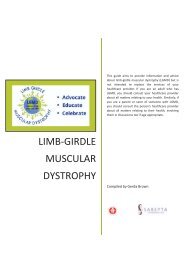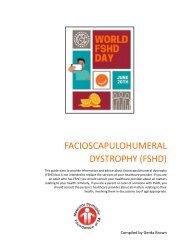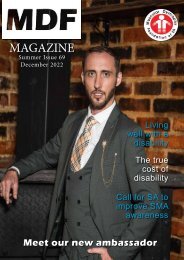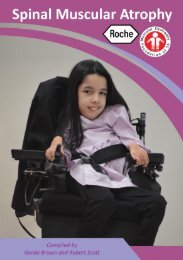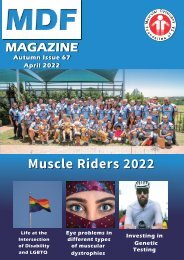Create successful ePaper yourself
Turn your PDF publications into a flip-book with our unique Google optimized e-Paper software.
Research
Breaking news in research
By Muscular Dystrophy UK
Promising updates on PTC Therapeutics’ trials for SMA
drug ‒ 17 June 2020
PTC Therapeutics has shared an update on two trials of
Risdiplam, an experimental drug for the treatment of spinal
muscular atrophy (SMA). The drug increases SMN protein
levels, the protein absent in people with SMA. The drug
works by targeting the SMN2 gene.
The SUNFISH trial investigated the effect of Risdiplam
in children and adults with SMA Type 2 or 3. Recent data
show Risdiplam improved motor function after 24 months of
treatment compared to natural history data.
JEWELFISH studies people with SMA aged six months
to 60 who have previously been treated with other SMA
therapies. Results showed that Risdiplam led to rapid and
sustained increases in SMN protein levels.
Positive news from Sarepta LGMD2E gene therapy trial
‒ 10 June 2020
Sarepta Therapeutics has shared an update on two groups of
patients who have received SRP-9003, as part of a study into
its gene therapy for limb girdle muscular dystrophy Type 2E
(LGMD2E).
SRP-9003 is an experimental AAV gene therapy that codes
for the full-length beta-sarcoglycan protein and has been
shown to increase gene expression – the process in which
the instructions in our DNA are converted into a functional
product, such as a protein – in muscle.
It’s a promising step forward in the study of gene therapy for
LGMD2E and provides information relevant to the company’s
other gene therapy studies, such as Duchenne muscular
dystrophy.
Acceleron discontinues drug development for CMT ‒ 10
March 2020
Today, Acceleron announced topline results from its Phase II
ACE-083 trial for Charcot-Marie-Tooth Disease. Although
the drug increased the size of the muscles it was injected
into, this did not translate into a clinical benefit i.e. there was
no improvement in muscle strength or function.
Unfortunately, this means that Acceleron is discontinuing
development of ACE-083 for CMT.
ACE-083 is a drug that inhibits a family of proteins that
negatively regulate muscle growth (including myostatin).
First CNM patient receives anti-sense drug ‒ 5 March
2020
Dynacure have announced that the first person in its Phase
I/II trial, Unite-CNM, has received the drug DYN101. This
is the first time that anyone with centronuclear myopathy
(CNM) has received an anti-sense drug.
DYN101 is an antisense drug designed to switch off DNM2,
a gene that is overactive in CNM.
More positive news from SMA SUNFISH trail ‒
6 February 2020
PTC Therapeutics have shared the clinical data presented at
the International SMA Europe Conference in France.
The study showed improvement in muscle function in
people with SMA type 2 and 3 when treated with risdiplam
over a period of 12 months. Children aged 2-5 years, showed
improvement compared to those not receiving the drug.
In people older than 5, the progression of the condition
stabilised.
The company will be presenting the data in a conference
call for investors at 1pm today. It can be accessed by dialing
(973) 935-8152 five minutes before the start of the call and
entering the passcode 7757508.
FSHD drug granted orphan drug status by FDA –
29 January 2020
Fulcrum Therapeutics has announced that the United States
Food and Drug Administration (FDA) has granted Orphan
Drug designation (ODD) to losmapimod for the treatment
of patients with FSHD. This designation gives Fulcrum
certain financial benefits that will help to lower the cost
of developing the drug. Losmapimod has been shown to
“switch off” DUX4 in cells originating from people with
FSHD. The safety and efficacy of the drug is currently being
tested in a Phase 2 clinical trial. The results from this trial are
expected later in 2020.
Duchenne trial to extend to non-ambulatory boys and
men – 8 January 2020
Pharmaceutical company, Catabasis, and charity
Duchenne UK have announced a partnership to study
the drug, edasalonexent, in the non-ambulatory DMD
population.
Edasalonexent works by turning off an enzyme called
NF-kB, which is known to be overactive in DMD. It has
been shown to slow the progression of Duchenne and is
currently being evaluated in a phase 3 trial in boys aged four
to seven.
The new study will evaluate the safety and efficacy of the
drug in non-ambulatory boys and men and will be recruiting
in the UK.
Information obtained from: https://www.musculardystrophyuk.org/news/breaking-research-news/
37








